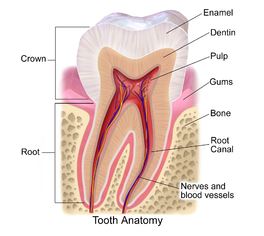What is Tooth Enamel?
Why am I losing tooth enamel? Tooth Enamel, the thin outer covering of your tooth, is the hardest tissue in the human body, covering the tooth’s visible part above the gums. Enamel protects teeth from the daily wear of chewing, biting, crunching and grinding, and painful temperatures and chemicals.
Though enamel is a hard material, it can crack and chip. It is translucent, meaning light can shine through it. Under the enamel is dentin, the part of your tooth that determines your tooth colour, whether white, off white, grey or yellow.
Materials that stain your tooth enamel are:
- coffee,
- tea,
- cola,
- red wine,
- fruit juice
- cigarettes
When enamel erodes, you will notice changes in temperature more often and/or you will be more sensitive to sweets as they get through to the nerves of the teeth. Enamel has no living cells, so the body cannot repair enamel once eroded.
Regular visits to the dentist are essential for cleaning and polishing to remove stains and keep teeth healthy.
What is Tooth Erosion?
Tooth erosion is the loss of the surface of your teeth due to acids you eat, drink or from your stomach, from vomiting, reflux and/or eating disorders. It is generally preventable with proper diet, oral hygiene and regular dental care. However, there are cases where more extensive dental treatment may be required to restore tooth erosion.
What Foods To Avoid
Acidic foods wear down your enamel. Watch out for:
- soft drinks (both sugar-free or sugar-containing)
- energy drinks, kombucha, fruit juice, cordials, vitamin waters
- citrus fruits (lemons, limes, oranges)
- lemon-flavoured drinks or teas
- fruit-flavoured lollies
- vitamin C tablets
- vinegar
- wine, pre-mixed alcoholic drinks
Food containing acids 330 (citric acid), 331 (sodium citrate), and 338 (phosphoric acid) are especially bad for teeth.
Preventing Dental Erosion
Preventing tooth erosion starts with limiting acid contact with teeth. Some ideas are:
- Eat a healthy, well-balanced diet.
- Drink fluoridated water rather than soft drinks or juice.
- Eat fruit, instead of drinking fruit juice,
- Eat fruit at meal times instead of between meals.
- Reduce the frequency of eating or drinking anything acidic and reduce the time it is in your mouth.
- Seek medical treatment for the management of reflux or vomiting.
- Do not chew vitamin C tablets; instead, take supplements that are swallowed whole.
- Chewing sugar-free gum after meals to promote saliva flow is crucial for protecting your teeth from erosion.
- After exposure to acids, you can neutralize the acid by rinsing with water, a fluoride mouth rinse, baking soda rinse (1 tsp of baking soda in a glass of water), or consuming dairy products.
How To Minimize Tooth Wear
- Use a soft-bristled toothbrush with fluoridated toothpaste.
- Avoid using abrasive toothpaste (some whitening toothpaste and charcoal-based toothpaste are more abrasive).
- Wear a custom made dental splint to prevent grinding your teeth at night.
Saliva
Some medications, dehydration and certain diseases can cause low saliva flow, contributing to tooth erosion. As saliva is a natural, effective tool against erosion, staying hydrated with fluoridated water washes acids out of your mouth into your stomach, neutralize acid and repair the early tooth softening by improving tooth minerals. Unfortunately, it cannot restore the lost tooth surface.
Restoring Tooth Enamel
Any lost surface of your tooth may need replacing with filling materials or crowns. Regularly visiting your dental professional helps identify dental erosion early, determine the cause, and develop strategies to prevent further dental erosion and tooth wear.
If you have any questions or to schedule an appointment, call Kesteven Dental Care Studio at 604-826-8087 or email drkesteven@shaw.ca.
By Lori Kesteven


